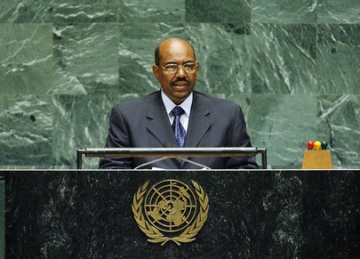US in a tough spot as Sudan’s president seeks visa to attend UNGA meetings
September 16, 2013 (WASHINGTON) – The United States has confirmed that it has received a visa application from Sudanese president Omer Hassan al-Bashir who is seeking entry to attend the United Nations General Assembly (UNGA) meetings taking place this month at UN headquarters in New York.

Bashir was charged by the International Criminal Court (ICC) in 2009 and 2010 on ten counts of war crimes, crimes against humanity and genocide in connection with the decade-long conflict in Sudan’s western region of Darfur.
The US is the only country in the world to label the conflict in Darfur as genocide during the administration of George W. Bush in 2004.
But as a host of the UN headquarters, the US is legally obligated to promptly grant visas to officials seeking to take part in activities of the world body.
In 1988 however, the US refused to grant the late head of the Palestine Liberation Organization (PLO) Yasser Arafat a visa to address the United Nations during a special session on the Middle East drawing strong criticism from Arab and European nations alike. This forced the UN to move the meeting to the UN headquarters in Geneva.
At the time the Washington justified its refusal by saying that the Congress conditioned the entry of the US into the UN headquarters Agreement on the retention by the US government of the authority to bar the entry of aliens associated with or invited by the United Nations “in order to safeguard its own security”.
The Palestinian leader at the time stood accused by the US of terrorism.
The terrorism charge has not prevented the US from granting visa to controversial ex-Iranian leader Mahmoud Ahmedinejad whose country along with Sudan is on the US list of states that sponsor terrorism.
In August 2011, the US president Barack Obama issued a proclamation denying visas to individuals deemed to participate “in serious human rights and humanitarian law violations and other abuses”.
This includes “any alien who planned, ordered, assisted, aided and abetted, committed or otherwise participated in, including through command responsibility, war crimes, crimes against humanity or other serious violations of human rights, or who attempted or conspired to do so”.
Designating individuals on this list is the responsibility of the US Secretary of State in consultation with the Secretary of Homeland Security, the proclamation reads.
However it clearly states that “nothing in this proclamation shall be construed to derogate from United States Government obligations under applicable international agreements”. The UN headquarters agreement would fall under this category.
The US is also not a signatory to the ICC’s Rome Statute and according to the 2002 law passed by US congress, Washington is prohibited from cooperating with the Hague-based court in any aspect including the extradition of suspects.
In the past the US has criticised countries like China for receiving Bashir and last June Larry André, Director of the Office of the Special Envoy for Sudan and South Sudan at the US State Department told US lawmakers that the Obama administration is working to press countries to refrain from receiving with Sudanese official wanted by the ICC.
“We just recently communicated to quite a number of our embassies where we think that some of those indicted by the International Criminal Court (ICC) may travel; language for them to use with the government, their host government to make certain that it is well understood our opposition to that travel. We continue to have a policy of not meeting or conducting business with those individuals who have been indicted” he said.
‘PRESENT YOURSELF TO THE ICC FIRST’
The US State Department confirmed Bashir’s visa application but declined to say whether they will issue him one and instead rebuked his desire to travel to New York.
“We condemn any potential effort by President Bashir to travel to New York, given that he stands accused of genocide, war crimes, and crimes against humanity by the International Criminal Court. We would say that before presenting himself to UN headquarters, President Bashir should present himself to the ICC in The Hague to answer for the crimes of which he’s been accused,” the State Department’s Marie Harf told reporters.
When asked about the US potential decision, Harf said she cannot discuss specific details of individual visa cases.
“I don’t want to get ahead of where we are here. I don’t want to make a prediction,” she added.
The US ambassador to the UN Samantha Power also decried reports of Bashir’s travel to the UN.
“Such a trip would be deplorable, cynical and hugely inappropriate. We would suggest that given that he is under those chargers, and that the ICC has indicted him, again, on genocide, war crimes, and crimes against humanity charges that it would be more appropriate for him to present himself to the ICC and travel to The Hague,” Power said.
The Sudanese president trip to the US will have to be carefully planned to avoid flying through countries that are ICC members which would effectively cover most of Europe.
Since his indictment, Bashir has seen his travel difficulties mount even to non-ICC members.
In July, Bashir’s reportedly “fled” Nigeria where he was scheduled to take part in a regional summit over a case filed in a local court by the Nigeria Coalition on the International Criminal Court (NCICC) to compel the government to arrest him.
Last month, Saudi Arabia barred his plane from crossing its airspace en route to Iran but Riyadh denied that the decision was politically motivated.
A similar situation occurred in June 2011 when Turkmenistan and Tajikistan refused to give permission to Bashir’s plane to enter their airspace in order to reach China where he was to start a state visit. As a result he was forced to return to Tehran where he was attending a summit there and decide on a new route to reach Beijing.
(ST)
